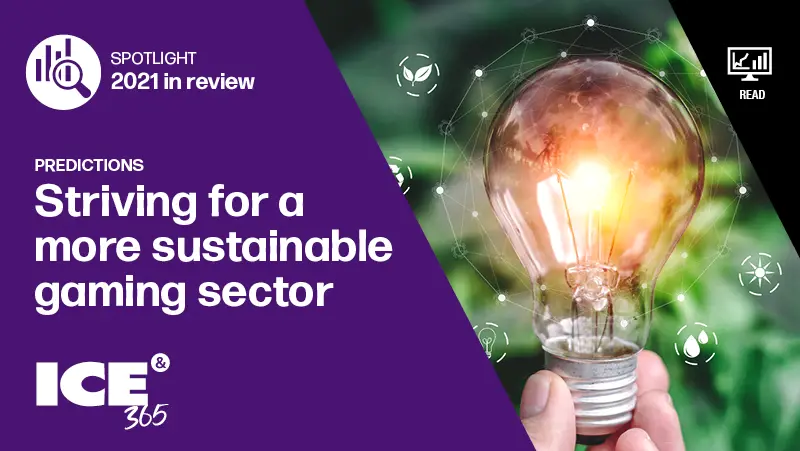Predictions: Striving for a more sustainable gaming sector
ESG is fast becoming a big buzzword in the industry, but is this just greenwashing, or a genuine push for change? Experts from across the gaming industry share their thoughts.

Sustainability is becoming an increasingly important part of the gaming industry, and businesses are striving to prove that they’re taking the issue seriously.
Industry insiders reflects on the progress made in the field of sustainability in 2021, and look forward to see how things can progress in the new year.
Featuring:
Nicole Garrett, head of policy and regulatory affairs, Betting and Gaming Council
Laura Da Silva, director, DigitalRG.com
Keith Whyte, executive director, National Council on Problem Gambling
Much has been said about the industry ’s need to change in 2021. Do you feel progress was made?
Laura Da Silva, director, DigitalRG.com (LDS): Not really. We can see progress in "pledges" and to some extent "awareness". But unfortunately, even more progress in greenwashing than "net positive impact". Microsoft is far from perfect, but their CEO has been asking for less pledges and more impact, in line with their ambitious plan to be carbon negative by 2030 which has already yielded some positive results.
Companies need to monitor their progress seriously and not evade the parts that are uncomfortable. At the moment, we hear so many statements: "being carbon neutral", "diversity and inclusion is at the heart of our business", "0% problem gamblers" … I’d like to see more impact, and less of people shouting about things before they do them.
Nicole Garret, head of policy and regulatory affairs, Betting and Gaming Council (NG): As we return to business as normal, our work in raising standards at the Betting and Gaming Council has continued at pace throughout 2021. We’ve made significant steps forward in our safer gambling initiatives, including the replacement of the industry-wide safer gambling campaign ‘When the fun stops, stop” with our new message of “Take Time to Think”.

We welcome the work our operators have undertaken in promoting the message and we look forward to be it being rolled out further in 2022.
BGC members abide by our strict codes of conduct, above and beyond regulatory requirements, which evolve as issues arise but we continue to see operator-led initiatives, including the use of AI and data to inform customer interventions, to create a safer gambling environment.
Keith Whyte, executive director, National Council on Problem Gambling (KW): Decent progress was made on responsible gambling in the US sports betting and online gambling sector in 2021. In the midst of the largest and fastest expansion of gambling in our history several operators have stepped up their internal and external responsible gambling initiatives.
However, true sustainability is still a ways away and the positive performance of leading companies continues to mask the poor record of other operators in this space, other verticals such as racing and social casino, and especially those state governments who continue to refuse to devote public funding to prevent, treat or research gambling problems.
Where do you feel more work is needed?
NG: While we are happy with the progress that has been made, we are of course never complacent and work continues daily to bring forward safer gambling measures at the Betting and Gaming Council. Work continues across the full spectrum of safer gambling issues, from working with the largest tech platforms to understand how we can better use advertising technology in this space to minimise the exposure of vulnerable and underage individuals to gambling advertising, to looking at game design and how we can ensure products are transparent and easily understood by customers.
LDS: The first step is knowing where you stand to be able to set the right objectives and see if you’re progressing. There also needs to be more clarity, transparency and consistency about how organisations measure impact such as excessive play or problem gambling

With environmental impact, the industry needs to understand differences between "scope I, II & III". They often focus on a small portion of scope one – their own direct impact. They have so much power and influence. They therefore have the great responsibility to look beyond their own impact. How can they move the dial with suppliers, the industry, even players...
We often hear that the industry doesn’t have much environmental impact and this is therefore not a priority. However, this is an outdated view. Whatever parts of the world you operate in or whatever the industry, environmental issues should be a key priority. It should be part of the business strategy every time.
KW: More work is needed across all stakeholders. Operators must have a corporate responsible gambling and sustainability plan with funding, metrics and outcomes tied to executive compensation. A critical component of a modern responsible gambling plan is to use data collected by operators and their vendors to inform and influence player protection initiatives.

Another area where more work is needed is the public sector. Every US state, territory and tribal government needs to embrace a public health approach and devote at a minimum 1% of their gambling revenue to fund gambling addiction prevention, treatment and research programs. Otherwise there will remain significant gaps in the safety net which is a critical component of a sustainable gambling industry.
Do you feel that the industry’s talk about sustainability will turn into more action in 2022? What would you like to see happen?
NG: The industry’s commitment to safer gambling over the past year has already proven that we are serious about taking action. We welcome the recent Gambling Commission report which showed that the rate of problem gambling has fallen from 0.6% to 0.3% over the past year and I believe that the work of BGC members and their commitment to improving safer gambling standards has played a role in this. In 2022, I hope we have the opportunity to work with our members on further initiatives, going above and beyond and setting an example for the wider regulated industry.
LDS: I want to stay optimistic and look at a few simple steps we can all take to make things better. Let's hold CEOs truly accountable for progress – not by 2030 only, but quarterly progress for example, the same way they’re held accountable for financial progress.
I'd like to see more employees raising their voice and understanding they have much more power than they often believe. No matter what you do, you can push to have a positive impact. Asking questions such as "do we have a plan on environmental impact?" will show that staff cares and the company needs to act in order to attract and retain the best talents.
Then some specific jobs can have other specific impacts. Somebody who works in a purchasing department at any gaming industry can push to include requirements for suppliers to have some understanding of environmental impact or to provide more environmentally sound products. Everyone can make or influence change. Start by raising concerns and keep on asking questions.
KW: In the US it is impossible for the sports betting and online gambling sector to be truly sustainable as long as they continue to operate in jurisdictions without problem gambling services.
We urge operators withdraw from markets with no or inadequate funding for problem gambling programs, or at the very least use their often considerable legislative clout to push governments to fully fund gambling harm minimisation efforts.
It would also be refreshing for companies to provide public reports and metrics on their responsible gambling programs and sustainability goals. Regulators and advocates need this information to assess progress. Public and verifiable reporting is the best way to turn talk into action.